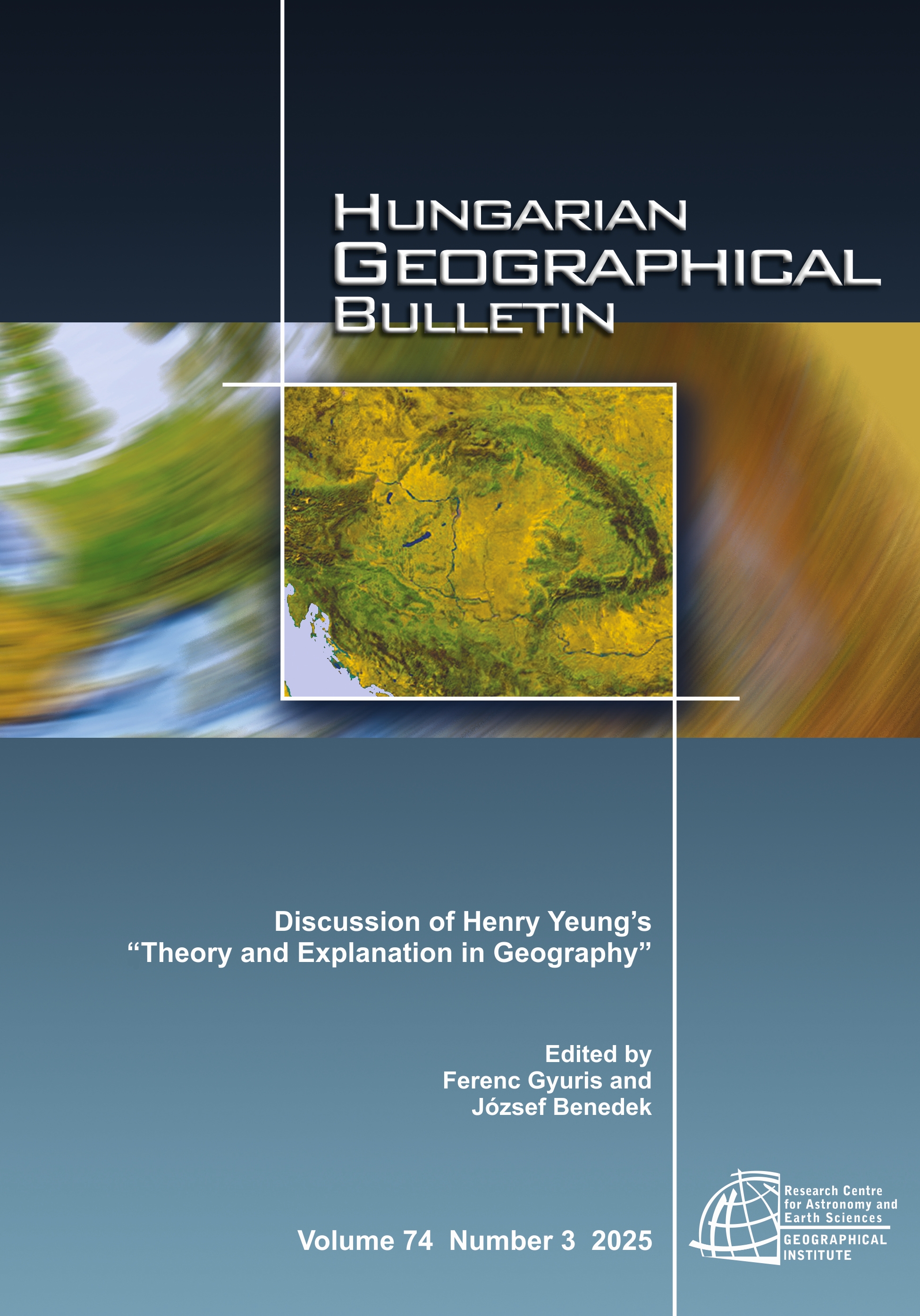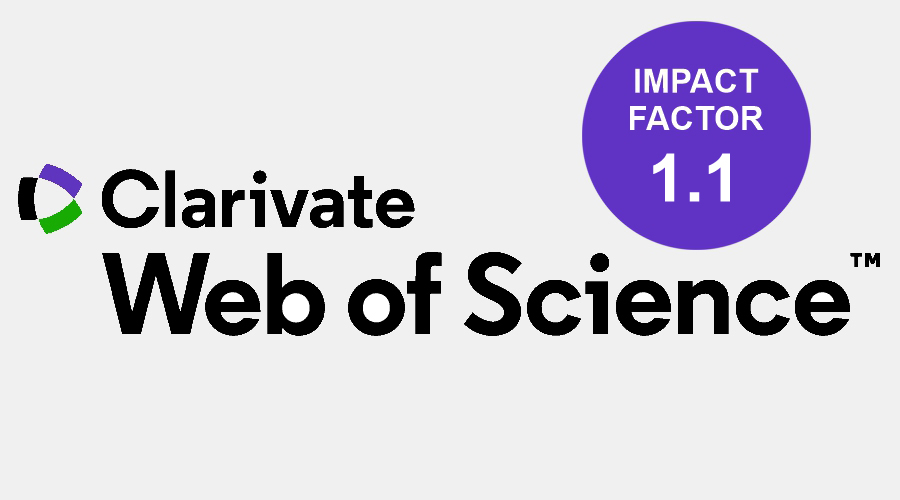Theory, explanation and references in geography: Comparing two seminal books by David Harvey and Henry Yeung
Abstract
This article aims to present how the comparative bibliometric analysis of seminal books’ reference lists reflects, and enables scrutinising, some fundamental structural characteristics of the functioning of Geography as a scientific discipline in different periods. It employs David Harvey’s Explanation in Geography, a magnum opus of Geography’s quantitative revolution from 1969, and Henry W. Yeung’s Theory and Explanation in Geography from 2024, a comprehensive conceptual work whose title consciously evokes Harvey’s volume, as case studies. After discussing the possibilities and limits of investigating books as imprints of changing academic practices and addressing methodological questions, the paper reveals a significant increase in the number of references and referenced publications between the two books. It reaffirms the rising share of journal articles (instead of books) and multi-author publications (instead of single-author ones) as structural outcomes of ‘academic neoliberalisation’, while revealing that books, book chapters and single-author publications still make a difference and have a considerable impact on academic discourses. It presents that ‘Geography’ as a term has become rather a synonym of ‘Human Geography’ in certain contexts, instead of containing both Human and Physical Geography. The results prove a significant growth in the impact of publications by female authors and the visibility of scholars outside the UK and the USA, including the Global South. At the same time, they still indicate a firm male dominance and the hegemony of Anglo-American authors and English language publications in the discipline.
References
BARNES, T.J. 2001. Lives lived and lives told: Biographies of geography’s quantitative revolution. Environment and Planning D: Society and Space 19. (4): 409–429. https://doi.org/10.1068/d304
BARNES, T.J. and BERGMANN, L.R. 2022. The early years: William Bunge and ‘Theoretical Geography’. In Recalibrating the Quantitative Revolution in Geography: Travels, Networks, Translations. Eds.: GYURIS, F., MICHEL, B. and PAULUS, K., Abingdon–New York, Routledge, 180–193. https://doi.org/10.4324/9781003122104-12
BROAD, W.J. 1981. The publishing game: Getting more for less. Science 211. (4487): 1137–1139. https://doi.org/10.1126/science.7008199
BUNGE, W. 1962. Theoretical Geography. Lund, C.W.K. Gleerup.
BUNGE, W. 1966. Theoretical Geography. 2nd edition. Lund, C.W.K. Gleerup.
COE, N.M. and YEUNG, H.W. 2015. Global Production Networks: Theorizing Economic Development in an Interconnected World. Oxford, Oxford University Press. https://doi.org/10.1093/acprof:oso/9780198703907.001.0001
CUPPLES, J. 2020. No sense of place: Geoscientisation and the epistemic erasure of geography. New Zealand Geographer 76. (1): 3–13. https://doi.org/10.1111/nzg.12231
EYLES, J. 1989. The geography of everyday life. In Horizons in Human Geography. Eds.: GREGORY, D. and WALFORD, R., London, Palgrave, 102–117. https://doi.org/10.1007/978-1-349-19839-9_6
FERRETTI, F. 2020. History and philosophy of geography I: Decolonising the discipline, diversifying archives and historicising radicalism. Progress in Human Geography 44. (6): 1161–1171. https://doi.org/10.1177/0309132519893442
GYURIS, F. 2014. The Political Discourse of Spatial Disparities: Geographical Inequalities Between Science and Propaganda. Cham, Springer. https://doi.org/10.1007/978-3-319-01508-8
GYURIS, F. 2018. Problem or solution? Academic internationalisation in contemporary human geographies in East Central Europe. Geographische Zeitschrift 106. (1): 38–49. https://doi.org/10.25162/gz-2018-0004
GYURIS, F., MICHEL, B. and PAULUS, K. (eds.) 2022. Recalibrating the Quantitative Revolution in Geography: Travels, Networks, Translations. Abingdon–New York, Routledge. https://doi.org/10.4324/9781003122104
GYURIS, F., BORBÉLY, G. and KOCSI, V.A. 2025. Global production networks: A geographical review of a research tradition. Hungarian Geographical Bulletin 74. (3): 301–326. https://doi.org/10.15201/hungeobull.74.3.5
HANNAH, M.G. 2018. Surviving neo-liberalism and the liberal backlash. Geographische Zeitschrift 106. (1): 16–26. https://doi.org/10.25162/gz-2018-0002
HARVEY, D. 1969. Explanation in Geography. London, Edward Arnold.
HARVEY, D. 1989. From managerialism to entrepreneurialism: The transformation in urban governance in late capitalism. Geografiska Annaler: Series B, Human Geography 71. (1): 3–17. https://doi.org/10.1080/04353684.1989.11879583
HONES, S. 2025. Writing and reading human geography. Progress in Human Geography. Online publication, 9 August 2025. https://doi.org/10.1177/03091325251365281
HUBBARD, P., KITCHIN, R. and VALENTINE, G. (eds.) 2008. Key Texts in Human Geography. London, Thousand Oaks – New Delhi–Singapore, SAGE. https://doi.org/10.4135/9781446213742
JOHNSTON, R. 2005. On journals. Environment and Planning A: Economy and Space 37. (1): 2–8. https://doi.org/10.1068/a3811
JOHNSTON, R. 2008. Explanation in Geography (1969): David Harvey. In Key Texts in Human Geography. Eds.: HUBBARD, P., KITCHIN, R. and VALENTINE, G., London, Thousand Oaks –New Delhi–Singapore, SAGE, 25–32. https://doi.org/10.4135/9781446213742.n4
JOHNSTON, R. 2009. Geography and the social science tradition. In Key Concepts in Geography Second edition. Eds.: CLIFFORD, N., HOLLOWAY, S., RICE, S.P. and VALENTINE, G., London, Thousand Oaks – New Delhi–Singapore, SAGE, 46–65. https://doi.org/10.4135/9781446213742.n4
JOHNSTON, R. and SIDAWAY, J.D. 2016. Geography and Geographers: Anglo-American Human Geography since 1945 (7th edition). Abingdon–New York, Routledge. https://doi.org/10.4324/9780203523056
KORNAI, J. 1992. The Socialist System: The Political Economy of Communism. Princeton, CA, Princeton University Press. https://doi.org/10.1515/9780691228020
KORNAI, J. 2006. By Force of Thought: Irregular Memoirs of an Intellectual Journey. Cambridge, MA, MIT Press. https://doi.org/10.7551/mitpress/1708.001.0001
LOCKE, J. 1975 [1690]. An Essay Concerning Human Understanding. Oxford, Oxford University Press.
MÜLLER, M. 2021. Worlding geography: From linguistic privilege to decolonial anywheres. Progress in Human Geography 45. (6): 1440–1466. https://doi.org/10.1177/0309132520979356
OLECHNICKA, A., PLOSZAJ, A. and CELIŃSKA-JANOWICZ, D. 2019. The Geography of Scientific Collaboration. Abingdon–New York, Routledge. https://doi.org/10.4324/9781315471938
PAASI, A. 2005. Globalisation, academic capitalism, and the uneven geographies of international journal publishing spaces. Environment and Planning A: Economy and Space 37. (5): 769–789. https://doi.org/10.1068/a3769
PAASI, A. 2015. Academic capitalism and the geopolitics of knowledge. In The Wiley Blackwell Companion to Political Geography. Eds.: AGNEW, J., MAMADOUH, V., SECOR, A.J. and SHARP, J., Chichester, Wiley, 507–523. https://doi.org/10.1002/9781118725771.ch37
PAASI, A. 2025. Geopolitics of knowledge. In The Wiley Blackwell Companion to Political Geography (Second Edition). Eds.: MAMADOUH, V., KOCH, N., WOON, C.Y. and AGNEW, J., Chichester, Wiley, 56–72. https://doi.org/10.1002/9781119753995.ch4
PIKETTY, T. 2014. Capital in the Twenty-First Century. Cambridge, MA, Harvard University Press. https://doi.org/10.4159/9780674369542
PUENTE LOZANO, P. 2025. The ironic (mis)fortunes of geographic theory: Sceptic musings on a sexy oxymoron. Hungarian Geographical Bulletin 74. (3): 253–268. https://doi.org/10.15201/hungeobull.74.3.2
RADCLIFFE, S.A. 2022. Decolonizing Geography: An Introduction. Cambridge, Polity Press.
ROY, A. 2020. ‘The shadow of her wings’: Respectability politics and the self-narration of geography. Dialogues in Human Geography 10. (1): 19–22. https://doi.org/10.1177/2043820619898899
SCHELHAAS, B., FERRETTI, F., REYES NOVAES, A. and SCHMIDT DI FRIEDBERG, M. (eds.) 2020. Decolonising and Internationalising Geography: Essays in the History of Contested Science. Cham, Springer. https://doi.org/10.1007/978-3-030-49516-9
SHEPPARD, E. 2012. Geography’s cultures of publication. AAG Newsletter (Nov 1). https://doi.org/10.14433/2012.0004
SHEPPARD, E. 2015. Piketty and friends: Capitalism, inequality, development, territorialism. The AAG Review of Books 3. (1): 36–42. https://doi.org/10.1080/2325548X.2015.985538
SLAUGHTER, S. and LESLIE, L. 1997. Academic Capitalism: Politics, Policies, and the Entrepreneurial University. Baltimore, MD, Johns Hopkins University Press.
SULLIVAN, R. 2017. The Geography of the Everyday: Toward an Understanding of the Given. Athens, GA, University of Georgia Press. https://doi.org/10.2307/j.ctt1pwt6h1
THRIFT, N. 2021. Killer Cities. London, SAGE. https://doi.org/10.4135/9781529752977
TISSOT, M.A. 1881. Mémoire sur la Representation des Surfaces et les Projections des Cartes Géographiques (Memory on the representation of surfaces and the projections of geographical maps). Paris, Gauthier-Villars.
WILKINSON, R.G. and PICKETT, K. 2009. The Spirit Level: Why More Equal Societies Almost Always Do Better. London, Allen Lane.
YEUNG, H.W. 2024. Theory and Explanation in Geography. Hoboken, NJ, Wiley. https://doi.org/10.1002/9781119845515
YEUNG, H.W., PUENTE LOZANO, P., BENEDEK, J., ŢOIU, A. and GYURIS, F. 2025. Panel discussion of Henry Yeung’s Theory and Explanation in Geography. Hungarian Geographical Bulletin 74. (3): 233–252. https://doi.org/10.15201/hungeobull.74.3.1
Copyright (c) 2025 Ferenc Gyuris

This work is licensed under a Creative Commons Attribution-NonCommercial-NoDerivatives 4.0 International License.






